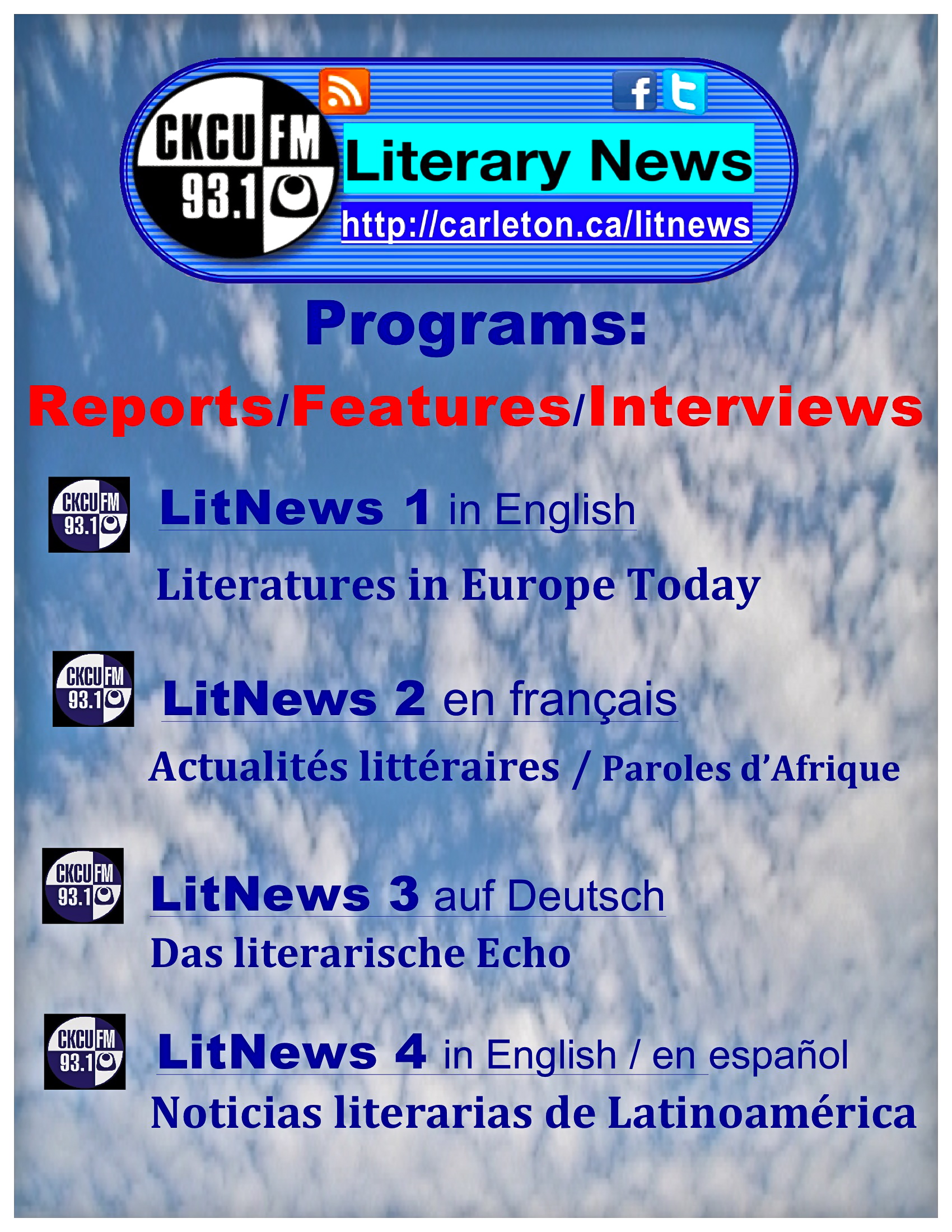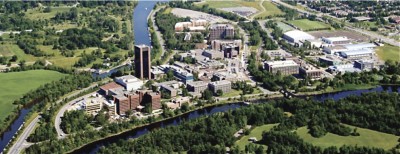![]()
CKCU-FM93.1/Literary News is airing podcasts in partnership with the POETRY Magazine> http://poetryfoundation.org
PLEASE SCROLL DOWN TO THE PROGRAM DESCRIPTIONS.
Veuillez défiler vers le bas. Bitte nach unten scrollen.
CKCU LitNews-1
Literatures in Europe Today
GENERAL PROGRAM INFORMATION
CKCU Literary News is an internet-based broadcasting service of Radio CKCU-FM 93.1. Launched in 1975 as the first campus radio in Canada, the station is an integral part of Carleton University and its community of friends and partners in the National Capital Region and beyond. It is currently producing four programs:
CKCU LitNews-1 Literatures in Europe Today, hosted by Hans G. Ruprecht, Podcast-1
CKCU LitNews-2 Les Actualités littéraires dans le monde francophone , hosted by Hans G. Ruprecht, Podcast-2;
CKCU LitNews-3 Das literarische Echo. Deutschsprachige Litertur im Gespräch, co-hosted by Hans G. Ruprecht & Helmut Zobl, Podcast-3 .
CKCU LitNews-4 Noticias literarias de Latinoamérica / Latin American literary news, co-produced with Alberto Quero (Venezuela).
These programs can be heard locally on FM 93.1, Wednesdays, 9:30 – 10:00 a.m. EST , and on CKCU LitNewsSTREAM (in Europe at 15:30-16:00 CET) LISTEN LIVE, on ALL CKCU Literary News PLAYLISTS and as PODCAST. The episodes of CKCU LitNews-1, LitNews-2, and CKCU LitNews-3 are being posted as MP3-audio files for free and easy downloading; whereas older audio files of CKCU LitNews-3 are still accessible in the archive of Das literarische Echo at www3.carleton.ca/litecho/archiv.html
Format
Episodes consist of various modes of interfacing with local or foreign correspondents, and of dialogues with special guests in the studio. The duration of each episode is 30 minutes, and occasionally twice as long, because some episodes may include a supplementary podcast in addition to the broadcast. Shows are being aired without commercial breaks.
Content
Given the complexity of the wider geographical, historical and sociopolitical context of such culturally diverse traditions, circumstances and ways of creative writing in Europe; the vast amount of information available about Literatures in Europe Today; and, last but not least, the ‘normal constraints’ (budget-wise, personnel-wise, etc.) that define the program’s mode of production, the content of newscasts therefore pertains only to the following points:
- Selected writers and their recent works as reviewed in Europe
- Regional differences (cultures / languages / borders)
- Historical relations (traditions / changes)
- Books (poetry, fiction, drama, essay) in the News
- Prizes (national, international award-winning authors)
- Themes, genres and styles of contemporary writing
- New Media (blogs, e-magazines) and creative writing
- Circumstances of commemorative celebrations
- Inter- / national literature (theatre, poetry) festivals,
- Inter- / national book fairs (London, Paris, Frankfurt, etc.)
- Perspectives on cultural, and ‘literary life’in major European cities
- Latest trends in dramatic performance
- New film adaptations of fiction: reception and critique
In dialogue with Canadian and European correspondents, who are graciously volunteering their time to participate in the broadcast, the show informs, from every aspect possible, about the considerable range of debate LITERATURE is generating in Europe, as it always has and continues to do in many countries.
If there is a common thread running through the episodes of the show, then it may well be one that is also entwined with the multicultural fabric of Canadian society. In fact, in this vast country of ours many people do relate to each other in full awareness of their European cultural heritage, which includes shared experiences of literary readings.
In addition to presentations of specific literary news items from all over Europe the program about Literatures in Europe Today proposes to engage guests, correspondents, and listeners in exploring program-related themes and literary subject matters, including the following:
- Rethinking ‘the literary’ in Europe today
- Canadian media coverage of European writing: What do we get?
- Literary expressions of post-national / regional identities
- Reconstructing the recent past in fiction
- ‘War-torn European countries’ as a theme
- The Holocaust: mourning and memory in creative writing
- 1989 – writing twenty years later
- Writers mediating borderland experiences
- The figure of the exiled, refugee, immigrant
- Narratives of migration, immigration
- Experiences of ethnic cleansing, displacement, and loss
- Self and otherness in fiction, drama, and in poetry
- Overcoming / living with cultural divides
- Writing in more than one language
- The literary ‘publishing industry’ in Europe
- European bestsellers: Translation, reception, success
- Popular literary genres
- Poetic voices on the outside: Can they be heard?
- Circulating writers, ‘écrivains sans frontières’
- Essayists and critics read across Europe
- Is there an established ‘literary scene’ across Europe?
- Writers speaking up for people and causes
- Contemporary creative writing and the canons of ‘modern literature’
- Literature and new media in Europe
- Literary perspectives from the margins of society
- Fractured communities: writing about sub-cultural identities
- Literary traditions of resistance and dissidence: Are they still alive?
- Transgressive ‘underground’ writing: Where? what about?
- Are there any new trends, or emerging literary movements?
Production
The program is recorded and produced in the Studios of CKCU. Its content is © copyright protected. It may be reused for educational purposes with the permission of the broadcaster.
(Video: Editing in the CKCU Production Studio.)
Contact:
radio.ckcu.litnews@gmail.com
Social media:
www.linkedin.com/in/hostckculitnews
www.twitter.com/#!/ckculitnews
www.facebook.com/ckculitnews
Skype: radiockcu-litnews
mb +1 (613) 883-2120
tf +1 (613) 730-2220
CKCU Reception, weekdays 8:00 – 17:00 EST: + 1 (613) 520-2898
Postal Address:
Radio Carleton CKCU-FM
Unicentre, Room 517
Carleton University
1125 Colonel By Drive
Ottawa, ON K1S 5B6 / Canada
CKCU LitNews-2
Actualités littéraires du monde francophone
et
Paroles d’Afrique: entretiens, reportages et poésie
CKCU-FM 93,1 est la station de radio universitaire et communitaire située au campus de CARLETON U – ‘Canada’s Capital University’ – à Ottawa. Emettant vingt-quatre heures sur vingt-quatre, ses émissions peuvent être écoutées, localement sur 93,1 MHz (FM), dans un rayon de 100 km, et sur Internet http://ckcufm.com LISTEN LIVE .
La radiodiffusion en modulation de fréquence de CKCU Literary News, page d’accueil comprend des émissions littéraires en anglais, français et en allemand. Elles font partie intégrante de la grille de programmes d’intérêt culturel en treize langues aussi diffusés par CKCU-FM.
Lancé en 2010, à l’occasion du trente-cinquième anniversaire de la station, CKCU Literary News, nouveau média d’information littéraire, diffuse ses émissions MER de 9H30 – 109H0 HNE au Canada / 15H30 – 16H00 HEC (Europe) en direct et en continu (sur Internet), puis en différé (sur la liste d’écoute automatique Audio filPLAYLIST). Toutes les émissions sont aussi à écouter en baladodiffusion (podcast) comme suit:
- CKCU LitNews-1 Literatures in Europe Today, au microphone Hans G. Ruprecht et ses invités, en différé > Podcast-1
- CKCU LitNews-2 Les Actualités littéraires dans le monde francophone, au microphone Hans G. Ruprecht et ses invités, en différé > Podcast-2
- CKCU LitNews-3 Das literarische Echo. Deutschsprachige Literatur im Gespräch, au microphone Hans G. Ruprecht et Helmut Zobl, voir HP> http://www.carleton.ca/litecho/ en différé > Podcast-3 , voir aussi LitEcho Archiv.
- CKCU LitNews-4 Noticias literarias de Latinoamérica / Latin American literary news, une émission bilingue copodruite avec Alberto Quero (Venezuela).
La programmation de ces émissions s’inspire de principes directeurs et des valeurs auxquels adhèrent les pays signataires de la Convention sur la protection et la promotion de la diversité des expressions culturelles(UNESCO 2005). Elle déclare notamment «que la culture prend diverses formes dans le temps et dans l’espace et que cette diversité s’incarne dans l’originalité et la pluralité des identités ainsi que dans les expressions culturelles des peuples et des sociétés qui constituent l’humanité».1
Dans la mesure que la diversité et des traditions littéraires d’expression française et des pratiques textuelles contemporaines, qui l’augmentent la rendant encore plus impressionnante, relève aussi de ce qui est dans ‘la vie littéraire’ des pays francophones d’ordre géographique, historique et socioculturel, les émissions sur CKCU LitNews-2 poursuivent un triple objectif:
1/Apprécier “l’originalité et la pluralité des identités” telles qu’elles se manifestent dans les pays de la Francophonie par la créativité littéraire sous toutes ses formes.
2/Apporter des nouvelles littéraires francophones d’actualité locale, régionale et nationale autant que transnationale (nouveautés, grands prix littéraires, foires / salons du livre, festivals littéraires, saisons théâtrales, anniversaires, etc.).
3/Présenter aux auditeurs des écrivain(e)s dont les livres jouissent, dans leurs pays d’origine, et de la faveur des lecteurs et de l’attention suivie de la part des critiques littéraires.
Pour pouvoir présenter une vision élargie de la scène littéraire dans les pays de la Francophonie nos auditeurs, nos correspondant(e)s (lecteurs, gens de lettres; auteurs, éditeurs, critiques; professeurs, enseignants, étudiants ; parmi d’autres) ainsi que nos amis des réseaux sociaux sont priés de bien vouloir contribuer au succès du programme, par ex., en nous envoyant des petits dossiers à thème sur fichiers MP3 (durée: 15-20 min. ≤ 20 MB).
Voici un choix de thèmes qui intéressent nos auditeurs en milieu universitaire:
- La situation actuelle du littéraire au pays (à choisir) :
- Écrire, publier et lire en français dans un état officiellement unilingue / bilingue / trilingue / plurilingue.
- Les concours et prix littéraires du pays.
- Statut (place publique, média, institutions, rôle, prestige, influence) du littéraire.
- Édition, traduction et diffusion des ouvrages à l’intérieur / extérieur du pays.
- La littérature francophone du pays sur Internet (blogs, magazines en ligne, forums; bibliothèques, librairies, achats en ligne; les fichiers MP3 et MP4 à contenu littéraire disponibles sur Internet).
- Le marché du livre: La réception de la littérature d’autres pays.
- L’enseignement scolaire du canon littéraire national.
- Comment faut-il aborder, imaginer, penser la francopolyphonie2 littéraire au XXIe siècle? Interdépendance, métissage, migrations et réseautage virtuel, etc. autant de sujets qui méritent une attention suivie.
- Quelles sont les ‘pratiques littéraires’ propres à un quartier (‘cité ghetto’), un district, un territoire, une région, une aire linguistique? Et ce, pour tout dire, par opposition à l’identification de la Littérature aux principes normatifs de ‘littérarité’ établis, qui se répercutent dans des façades mondaines de ‘la vie littéraire’, voire dans les grands succès en librairie médiatisés comme dans les critères d’évaluation particuliers aux critiques, ou encore dans l’attribution des prix littéraires et la consécration officielle.
- Regards sur La poétique de la relation (E. Glissant)3 et les champs du littéraire francophone à l’air du numérique.
- Continuité / discontinuité des formes et genres de la création poétique, romanesque et dramatique, etc. par rapport à l’histoire récente des pays appartenant à la Francophonie (en Europe, au Maghreb, en Afrique, dans les Amériques et les Caraïbes, en Asie, etc.).
- Ecrivain(e)s francophones face aux grands défis de notre temps.
Nous mettons en ondes des entretiens téléphoniques, en nombre limité, avec des auteur(e)s où qu’ils/elles soient. Nous diffusons aussi des fichiers MP3 préparés spécialement pour nos émissions, et ce en collaboration avec des auteur(e)s qui ont bien voulu accepter notre invitation. La durée du temps d’antenne est 20 min. par émission, sans publicité intercalée. Gracieuesement offerte, cette coopération se fera sans frais.-
Les organisateurs et promoteurs d’importants événements à caractère littéraire (débats publiques, colloques, festivals de littérature, ‘nuits de la poésie’, anniversaires, commémorations, expositions, Salons du livre, etc.) sont priés de nous contacter pour que nous puissions communiquer de tels événements à nos auditeurs.
——————-
1/ Préambule, Convention sur la protection et la promotion de la diversité des expressions culturelles, www.agora.qc.ca
2 / Poétiques et Imaginaires / Francopolyphonie littéraire des Amériques, sous la direction de Pierre Laurette et Hans G. Ruprecht (Paris: Edtions L’Harmattan, 1995).
3 / Édouard Glissant, La poétique de la relation (Paris: Gallimard, 1990).
Hans G. Ruprecht,
Animateur, producteur, réalisateur
Courriel:
radio.ckcu.litnews@gmail.com
Réseaux sociaux:
www.linkedin.com/in/hostckculitnews
www.facebook.com/ckculitnews
www.twitter.com/#!/ckculitnews
Skype: radiockcu-litnews
mb +1 (613) 883-2120
tf +1 (613) 730-2220
CKCU Réception,de 8h00 à 17h00 EST: + 1 (613) 520-2898
Adresse postale:
Radio Carleton CKCU-FM
Unicentre, Room 517
Carleton University
1125 Colonel By Drive
Ottawa, ON K1S 5B6 / Canada
CKCU LitNews-3
Das literarische Echo
Deutschsprachige Literatur im Gespräch,
Kritiken und Kontroversen.
Sendezeit (im Anschluss an BBC World News): Mittwochs, 9.30 – 10.00 Uhr EST in Kanada / 15.30 – 16.00 Uhr MEZ (Europa) im Internet > CKCU LitNewsSTREAM > LISTEN LIVE und über die ABSPIELLISTE (CKCU Literary News PLAYLIST), dann auch zum Nachhören > CKCU LitNews-3 > Podcast-3
PROGRAMMSCHEMA
I. Ausgangspunkte
Die Sendungen verstehen sich als ein kanadisches Echo auf das literarische Leben in europäischen Ländern und Landesteilen, die überwiegend oder zum Teil deutschsprachiger Kultur sind.-
Die Programmgestaltung der Sendung bezieht sich auf folgende Ausgangspunkte:
- Was schreiben deutschsprachige Autoren heutzutage? Wie und für wen erzählen sie ihre Geschichten? Wovon handeln ihre Romane und Theaterstücke? Wie klingen ihre Gedichte? Was bedeuten ihre Texte?
- Wie soll man sie lesen und bewerten? Wer findet — große, geringe oder gar keine Beachtung? Was halten Kritiker von Bestsellern? Welche kulturelle Bedeutung haben heutzutage (noch immer?] die großen Literaturpreise in Deutschland, in Österreich und in der Schweiz? Finden sie grenzüberschreitende Beachtung?
- Welchen Platz nimmt neuartige, experimentelle Dichtung deutscher Sprache in der schweizer, österreichischen und deutschen Medienlandschaft ein? Wo und wie wird sie rezipiert? Was ist ‘literarische Öffentlichkeit’ im deutschsprachigen Raum? Wer sind die meinungsbildenden Köpfe?
- Die Sendungen sind auch ein Echo aus virtuellen Räumen im Internet, wo junge Lyriker, Schriftstellerinnen, und Stückeschreiber aus aller Welt ihre Werke in deutscher Sprache vorstellen und produzieren.*
- Wie wirkt aktuelle Literatur in deutscher Sprache im multikulturellen Rahmen globaler “Weltliteratur”? Gibt es sie? Als Goethe 1827 mit diesem Begriff eine ähnliche Frage aufwarf, waren die Bedingungen des literarischen Schaffens natürlich anders…
* Walter Benjamin war in dieser Hinsicht wegweisend; meinte er doch in seiner oft zitierten Ansprache, Der Autor als Produzent (1934): “Also ehe ich frage: wie steht eine Dichtung zu den Produktionsverhältnissen einer Epoche? möchte ich fragen: wie steht sie in ihnen? Diese Frage zielt unmittelbar auf die Funktion, die das Werk innerhalb der schriftstellerischen Produktionsverhältnisse einer Zeit hat.” Gesammelte Schriften II.2 (Suhrkamp Verlag, 1977), S. 686.
II. Aktuelle Schwerpunkte
Das sind Inhalte unterschiedlicher Art, die während der ersten Hälfte einer Sendung gebracht werden, z.B. Gespräche mit Autoren, die im Studio zu Gast sind. Dabei kann es auch zu einer ausführlichen Unterhaltung kommen, die den Inhalt einer ganzen Sendung füllt (20 Min.). Auch längere Telefongespräche sind möglich. Ferner wird eingangs auf erwähnenswerte Daten im Literaturkalendar (Gedenktage,Geburtstage) hingewiesen.
Literarische Kurznachrichten
Aktuelles aus dem deutschsprachigen Literaturbetrieb, z.B. beachtenswerte literarische Ereignisse; Preisverleihungen; öffentliche Ehrungen; Debatten und Kontroversen; Neues aus dem Verlagswesen, Buchmessen; Berliner Theatertreffen, Krimifest, etc;
Top-Ten Bestsellerlisten (in deutschsprachigen Medien)
Hinweise auf Tendenzen (literarische Geschmacksrichtungen): ‘Was geht derzeit gut?’ (Telefongespräche mit Verlegern, Kritikern, Buchhändlern); Hinweise auf noch ungedruckte, experimentelle ONLINE Werke; wenn möglich kurze Leseprobe aus besonders zu empfehlenden e-texten.
Wir besprechen kurz und empfehlen wirklich neue Titel (Romane, Lyrik, Theaterstücke; wichtige Neuausgaben; auch mal Biographien, Geschichtliches, Heiteres, Kontroverses, Reiseliteratur; Kriminalromane; Kinderbücher, Jugendliteratur, Hörbücher, e-books; aber leider keine Sachbücher.)
Besuche in virtuellen literarischen Salons, Cafés und Blogs mit kurzen Kommentaren zu aktuellen Inhalten, und wenn irgend möglich mit Toneinlagen. Was wird derzeit in den ‘Häusern der Literatur’ geboten?
III. Verschiedene Gesichtspunkte
> Die Moderatoren diskutieren (auch mal mit einem Gast) über das was sich aus der Lektüre eines Buches ableiten lässt: Sujet und Inhalt; Sprache, Erzählform, Gestalt. Die Handlung [Zeit/Raum]: darin die psychologische / historische Glaubwürdigkeit der Charaktere.
> Diskussion über inhaltlich bemerkenswerte, gestalterisch originäre Werkaspekte. Was ist neuartig an dem Buch? Wie ist es zu bewerten? Was heißt das überhaupt, ‘ein literarisches Werk bewerten’? Warum ist das Buch (sehr /nur begrenzt) lesenswert? Mit was ist es zu vergleichen? Welche kulturelle Bedeutung hat es? Dazu kommt danneine kurze Leseprobe.
> Gedankenaustausch über ein aktuelles Theaterstück: Wie war die Rezeption? Was sagen Feuilletonisten in Österreich, in der Schweiz und in Deutschland zu einer bedeutsamen Theateraufführung? Was besagt das über den ‘Erwartungshorizont’ der Zuschauer?
Das Gedicht des Monats aus drei Jahrhunderten (19 .- 21. Jhd.): Ein Gedicht wird vorgelesen und kurz besprochen: gesprächsweise werden mögliche Inhalte angedeutet, nichts ‘tiefschürfend’ interpretiert; vielmehr soll manches offen bleiben…
IV. Thematische Schwerpunkte
Das sind vorprogrammierte Inhalte, z.B. außerhalb des Studios aufgenommene Interviews mit Schriftstellern, die nach Ottawa zu Lesungen gekommen sind.
Thematisch ausgearbeitete Sendereihen, wie z.B. die bereits gelaufenen über ‘Literatur der Wendezeit’ und über ‘neue Literatur aus Österreich’, die noch immer im ARCHIV nachzuhören sind, unter > http://carleton.ca/litecho/archiv.html
Augenommene Telefongespräche (MP3-Dateien), z.B. mit Leseprogrammleitern in ‘Häusern der Literatur’ oder mit Lektoren deutschsprachiger Verlagshäuser. ‘Das literarische Leben’ in den virtuellen Räumen der Social-Networks und Foren mit denen CKCU Literay News mehrsprachig vernetzt ist (facebook | twitter ).Was lässt sich über die «junge Literatur» erfahren?
Unterhaltsame Behandlung umstrittener Themen
Vorgesehen sind Kommentare zu folgenden Themen:
- Literarische Fernsehsendungen: Show, Manipulation und Wirkung;
- Schreiben heute: Was hört man von jungen Autoren?
- Literarisches Leben im deutschsprachigen Raum: kulturgeschichtlich bedingt, geographisch begrenzt, sich selbst organisierend, virtuell und offen;
- Gibt es außer der «literarischen Sprachgemeinschaft», neben der kulturellen Eigenständigkeit und Vielfalt, noch etwas Spezifisches, das allen gemeinsam ist?
- Literatur und sozial-politisches Engagement — noch immer? Warum?
- “Die Wende” (1989-2009): Erzählte Zeitgeschichte;
- Merkmale massenhaft verbreiteter Belletristik;
- Literatur und Tabu: Gibt es noch tabuisierte Stoffe?
- Lyrik und Musik: Gibt es eine literarische pop culture?
- Formen und Ausdrucksweisen «intermedialer Literatur»;
- Literatur und Film: Gelungene / gescheiterte Verfilmungen;
- Literatur und bildende Kunst: Gibt es Beziehungen? Kafka, Hesse, Grass;
- Literarische Tradition heute: Wer beruft sich (noch?) auf [moderne?] Klassiker?
- Was ist postmodern?
- Wo gibt es eine avantgardistische Literatur deutscher Sprache?
- Publikumsgeschmack: Was lässt sich heutzutage dazu sagen?
- Deutschsprachige Schriftsteller in der Diaspora;
- Schriftsteller-/innen, die sich des Deutschen als Zweitsprache bedienen;
- Deutsch — eine literarische Weltsprache?
- Gibt es noch so etwas wie Dichterruhm? Wer kommt auf das blaue Sofa während der Frankfurter Buchmesse?
- Wie liest man heute? Buchkultur und e-books;
- Dichtung im virtuellen Raum – leicht findbar oder für immer verloren?
IMPRESSUM
Die Sendung Das literarische Echo wird vom universitätseigenen Sender CKCU-FM 93.1 auf dem Campus der Carleton University ( hier bitte en Video anklicken ) in Ottawa ausgestrahlt. Sie ist auch im Internet zu hören, auf CKCU LitNewsSTREAM > LISTEN LIVE.
Derzeit werden über 100 gespeicherte Radiosendungen im Archiv (podcast) sowie unter CKCU Literary News Podcast 3 zum Nachhören angeboten.
Moderatoren:
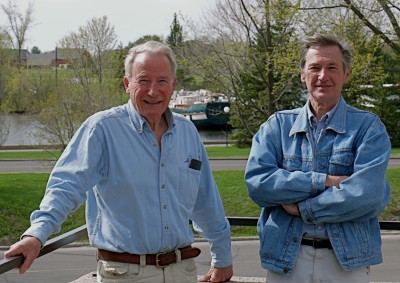
Dr. Hans-George Ruprecht und Dr. Helmut Zobl
http://www.carleton.ca/slals/faculty/linguistics/index.html
Kontakt:
radio.ckcu.litnews@gmail.com
www.linkedin.com/in/hostckculitnews
www.facebook.com/ckculitnews
www.twitter.com/#!/ckculitnews
Postanschrift:
Radio CKCU Literary News
Unicentre, Room 517
Carleton University
1125 Colonel By Drive
Ottawa, ON K1S 5B6 / Canada
Skype: radiockcu-litnews
mb +1 (613) 883-2120
tf +1 (613) 730-2220
CKCU Empfang,werktags 8.00 – 17.00 Uhr EST: + 1 (613) 520-2898
Das ist Carleton University video in Ottawa, am Rideau Kanal, ein UNESCO-Welterbe .
CKCU LitNews-4
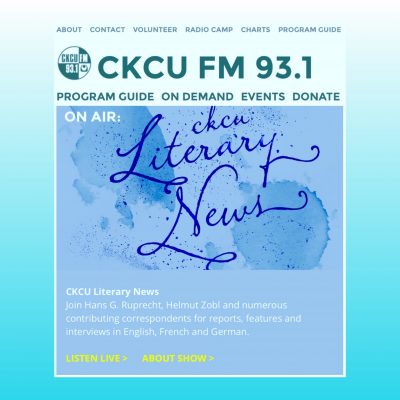
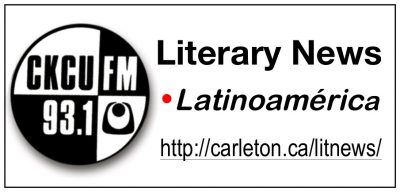
Noticias literarias de Latinoamérica / Latin American Literary News is a program being aired every second month by CKCU-FM | Literary News of the community based campus radio of CARLETON UNIVERSITY in Ottawa (Canada). It can be heard locally (alternating with other broadcasts about literature being aired in English, French and German) on FM 93.1, Wednesdays 9:30-10:00 EDT in Canada and worldwide on STREAM http://carleton.ca/litnews/stream/ as well as ON DEMAND http://carleton.ca/litnews/playlist/
This segment of the multilingual CKCU-FM Literary News casts – for more information please go to http://carleton.ca/litnews/programs/ – is bilingual, and it will be open for ad honorem contributions by young authors from all over Latin America.
Audio files of up to 25 minutes duration may be submitted in MP3 format to radio.ckcu.litnews[at]gmail.com
Dr. Alberto QUERO recently joined the CKCU-FM team as a contributing literary correspondent, bringing you the latest literary news from Latin America. Thanks to his feature reports and well-informed comments about literary news from Nuestra América, to use José Martí’s term. the Canadian audience will get acquainted with an always vibrating scene full of amazing literary events.
Alberto Quero is a writer and critic based in Maracaibo, Venezuela. He studied at the University of Zulia. He holds a BA in literature and linguistics, a Master’s degree in Venezuelan literature and a Doctorate in Humanities. He teaches English, French and Spanish as foreign languages, and he is a member of the Semiotics Association of Venezuela.
